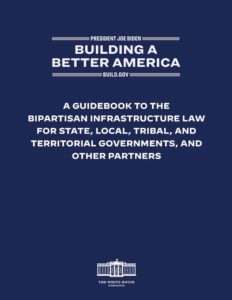Who is a member?
Our members are the local governments of Massachusetts and their elected and appointed leadership.
 The White House has released a range of documents and details about the $1.2 trillion Bipartisan Infrastructure Law, also known as the Infrastructure Investment and Jobs Act, enacted last November.
The White House has released a range of documents and details about the $1.2 trillion Bipartisan Infrastructure Law, also known as the Infrastructure Investment and Jobs Act, enacted last November.
The resources include:
• A 465-page comprehensive guidebook
• A searchable database of program funding, by agency, topic and funding mechanism
• A fact sheet for local governments on 25 competitive infrastructure funding opportunities, with the latest available information, including program descriptions, links to agency websites, and application timing
The infrastructure law supports new federal investments in a wide range of public systems over five years.
The administration has placed the programs in four broad categories:
• Transportation: Roads, bridges, passenger and freight rail, public transit, airports, ports, safety and electric vehicles, buses, and ferries
• Climate, Energy and Environment: Clean energy and power, water, resilience, and environmental remediation
• Broadband (including cybersecurity)
• Other Programs: Regional commerce, agriculture, health and human services
The following are the programs highlighted in the fact sheet for cities and towns:
Transportation
• Rebuilding American Infrastructure Sustainably and Equitably (RAISE)
• Port Infrastructure Development Program
• Bus and Bus Facilities Competitive Grants
• National Infrastructure Project Assistance (also known as “Megaprojects” or MEGA)
• Infrastructure for Rebuilding America (INFRA)
• Safe Streets and Roads for All (applications expected to open in May 2022)
• Charging and Fueling Infrastructure
• Clean School Bus Program
• Reconnecting Communities
• Rural Surface Transportation
Climate, Energy and Environment
• Building Resilient Infrastructure and Communities
• Flood Mitigation Assistance
• Brownfields Remediation Program
• Energy Efficiency and Conservation Block Grants
• Energy Efficiency and Renewable Energy Improvements in Schools
• Energy Improvement in Rural or Remote Areas
• Energy Efficiency and Resilience Code Adoption
• Regional Clean Hydrogen Hubs
• Community Wildfire Defense Grant Program
Broadband and Cybersecurity
• ReConnect Loan and Grant Program
• Middle Mile Grants Program
• State and Local Cybersecurity Grant Program
• Smart Grid Investment Grant Program and Energy Sector Operational Support For Cyber Resilience Program
Other Programs
• Water and Groundwater Storage and Conveyance
• Emergency Watershed Protection Program
Additional funding opportunities
The law significantly increased the amount of non-competitive formula funding that will flow first to states and then on to municipalities. Examples include funding available through Surface Transportation Block Grant sub-allocations for local governments, which now include significantly expanded flexibility for municipalities to determine how these funds can be used, as well as increases for Clean Water and Drinking Water State Revolving Funds.